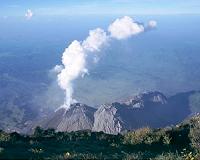| . |  |
. |
Rome (AFP) April 27, 2010 If and when Mount Vesuvius wakes up from its long slumber, it will threaten more than a million people, Italy's public safety chief said Tuesday. "Vesuvius is the biggest public safety problem there is in Italy, because entire towns lie in the area of the volcano and would be invaded by an eruption," Guido Bertolaso said. "For the time being the volcano is quiet, but we know very well that the day Vesuvius wakes up the situation will be absolutely dramatic," he told a news conference. The 18 towns around the volcano, which last erupted in 1944, are officially home to half a million people but the actual number is closer to 650,000, Bertolaso said. The civil protection chief was speaking two weeks after Iceland's Eyjafjoell volcano erupted, spreading an ash cloud across much of northern and western Europe and triggering the biggest disruption to aviation since World War II. Some analyses of Vesuvius's eruptive pattern suggest that the next explosion could be a major event such as that of 1631 in which 4,000 people died, Bertolaso said. The "eruptive column" of smoke, lava and ash could be as much as 20 kilometres (12 miles) high and blanket a 25-kilometre radius, he said. This is a worst-case scenario, Bertolaso said, adding that authorities were reviewing the disaster response plan "to see whether there is a need to widen the 'red zone' and elaborate evacuation plans for at least one million people, including many from Naples" itself. He said Neopolitans tended to be "disorganised and like to fend for themselves," traits that might complicate evacuation plans. And an initiative to persuade people to move away from the red zone was a "big failure," Bertolaso said, recalling that "a lot of people built a home in a safe area and then rented out the one in the red zone." Asked about a major hospital that is nearing completion just outside the red zone, on the eastern outskirts of Naples, Bertolaso recognised that it was the subject of debate but said it was not cause of concern because it was being built according to "rigorous seismic standards." But geologist Franco Ortolani of Naples' Federico II University said the hospital's defences against an earthquake were not at issue. "All you have to do is look at the map," he told AFP. "It's so obvious there are no guarantees of safety." A repeat of the eruption that destroyed Pompeii in 79 AD would threaten between two and five million people, but the likelihood of such an event is only around one percent. The 1944 eruption was far more benign, producing lava flows but without spewing hot ash and gases. Nevertheless, 26 people died and 12,000 lost their homes. "Unfortunately, no one in the world can predict when a volcano will wake up... or predict an earthquake," he said. "There's a week or 10 days from the first signs until the moment it's too late."
Share This Article With Planet Earth
Related Links Bringing Order To A World Of Disasters When the Earth Quakes A world of storm and tempest
 Volcano showers sand and ash over Guatemala: institute
Volcano showers sand and ash over Guatemala: instituteGuatemala City (AFP) April 27, 2010 The Santiaguito volcano showered sand and ash Monday over a large area of western Guatemala in an "unusual" and "violent" eruption, the national seismological institute said. Winds were carrying the ash in a northeasterly direction from the volcano, 2,500 meters (7,500 feet) above sea level in the province of Quetzaltenango, 206 kilometers (123 miles) west of the capital, it said. The a ... read more |
|
| The content herein, unless otherwise known to be public domain, are Copyright 1995-2010 - SpaceDaily. AFP and UPI Wire Stories are copyright Agence France-Presse and United Press International. ESA Portal Reports are copyright European Space Agency. All NASA sourced material is public domain. Additional copyrights may apply in whole or part to other bona fide parties. Advertising does not imply endorsement,agreement or approval of any opinions, statements or information provided by SpaceDaily on any Web page published or hosted by SpaceDaily. Privacy Statement |